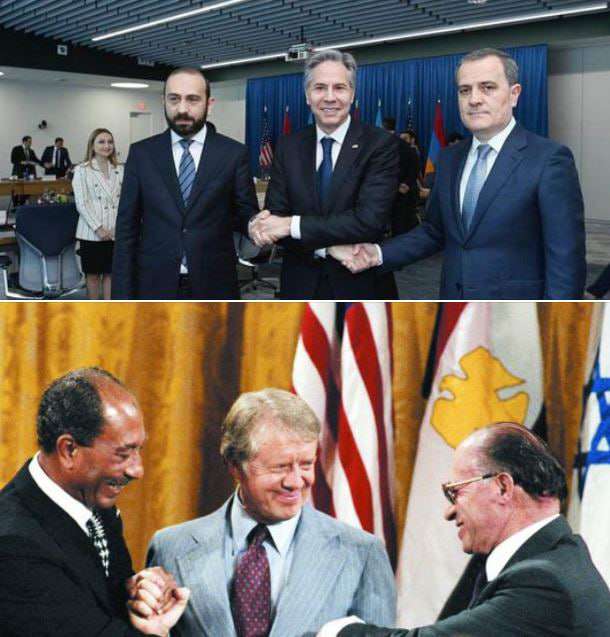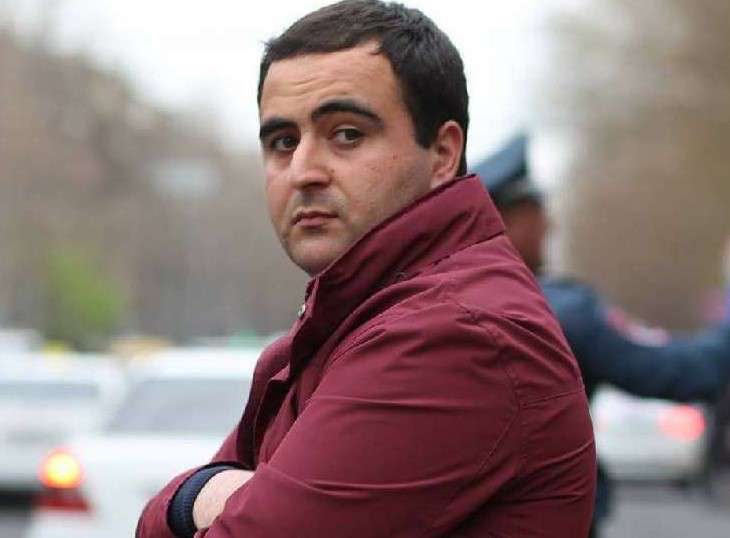Journalist Robert Ananyan wrote on his Facebook page.
"The negotiations between the Foreign Ministers of Armenia and Azerbaijan, Ararat Mirzoyan and Jeihun Bayramov, will last several days in Washington. Intensive negotiations must begin, staying for days. But it is more important for the USA to be a balancing mediator at the negotiating table.
The presence of the USA in the intensive negotiation will increase the effectiveness of the talks several times. Azerbaijan is under the euphoria of the victory of the 2020 war and wants to get concessions, which, if fulfilled, will threaten the statehood of Armenia. When Armenia and Azerbaijan appear alone at the negotiation table, Azerbaijan, supported by Russia and Turkey, speaks the language of military blackmail and threats. The US will balance and hopefully bring a balanced peace closer. The USA does not have its plan to achieve peace, the parties must agree, but the presence of the USA is a weighty factor in itself.
I remembered the Egyptian-Israeli agreements of Camp David. And the question arises whether the USA will be able to repeat the success of Camp David and reconcile the conflicting parties as a result of long-term negotiations. The Camp David Accords were historic peace agreements signed by Egyptian and Israeli leaders Anwar Sadat and Menachem Begin on September 17, 1978. Meetings were held at Camp David, Maryland, USA, to negotiate agreements. President Jimmy Carter from the USA participated. The protracted conflict ended in peace. But before the Camp David agreements were signed, there were long bloody wars between Israel and Egypt.
In 1967, Israel fought a six-day war in Egypt, Syria, and Jordan. Israel won the battle and gained control over the Gaza Strip and the Sinai Peninsula. In 1970, Anwar Sadat became president of Egypt. He wanted to regain control of the Sinai and end the war with Israel. In 1973, Egypt attacked Israel and tried to take back the Sinai Peninsula. Israel won the battle, but Sadat gained political prestige in the region for his bold military offensive.
In 1978, President Carter invited the leaders of Egypt and Israel to the United States. They met in secret at the presidential compound at Camp David, Maryland. The negotiations were tense. They lasted 13 days. President Carter was instrumental in speaking to both sides during the talks. On September 17, 1978, Egypt and Israel agreed and signed the deal. The treaties laid the foundation for peace between the two countries and the Middle East. Sinai was returned to Egypt. A peace treaty was signed, and diplomatic relations between Egypt and Israel were established. The Suez Canal was opened to Israeli ships.
This happened not only due to the regulatory role of the USA but also because the influence of the USSR on the process was neutralized. Azerbaijan and Armenia have a greater chance to achieve peace when Russia is not in the negotiations. Putin's regime is a generator of blood, war, and conflicts, and there will be Armenian-Azerbaijani peace if Moscow is absent from the process. The USA can become both the guarantor of peace and a certain component of security, formulating a framework in Artsakh, taking into account Russia's current impotence and the severe consequences that we face, for example, by setting up a checkpoint. The future will show.
Both Anwar Sadat and Menachem Begin won the Nobel Peace Prize in 1978. However, the rest of the Arab countries in the Middle East were not happy with Egypt. Egypt was expelled from the Arab League. He was condemned for signing a peace treaty with Israel. On October 6, 1981, Anwar Sadat was assassinated by Islamic extremists for his participation in the peace accords. The president of Egypt paid with his life, but he brought peace to the Egyptians.
The heads of state should have prudence and bring peace to their people by doing the impossible. Conflicts, of course, are different. The success of Egypt and Israel will not necessarily be repeated, and peace will also be achieved in the case of Azerbaijan and Armenia. But you have to try. There is always the option of war. Only balanced peace between Armenia and Azerbaijan can be lasting. The power ratio is not a static quantity. It is possible to have peace only with a win-win formula. There will be no peace at the expense of the complete victory of one side and the defeat of the other. Peace cannot be achieved at the expense of the weak. If the parties tried to act according to the logic of capitulation, both would lose. Today, Armenia is the defeated party; tomorrow, it may be Azerbaijan.
One can make a thousand arguments about why peace with Azerbaijan will not be achieved. Skepticism towards Baku comes from objective reality,
from ongoing war crimes. I can give a thousand reasons justifying the impossibility of peace, but wars end one day, and hopefully, we are getting closer to that day. You can disagree. I'm not very optimistic either, and I don't know whether this process will end with a new war or peace. However, I know that people never drink the toast of war but peace. For me, there is an indisputable truth: countries' leaders require an unprecedented high will, intelligence, and foresight.
I discovered these pictures by accident. Their similarity was interesting. This commonality between today's Armenian-Azerbaijani process and Egyptian-Israeli reconciliation already exists. We will see; life will show."



















